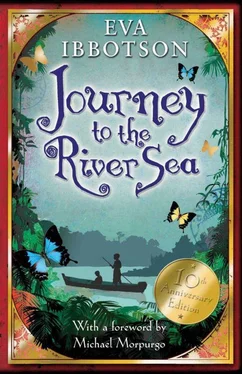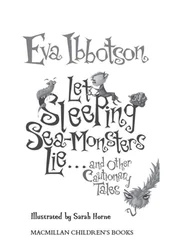When she got back with the babies, Miss Minton was usually at work on her English — Xanti dictionary, but today she was surrounded by a group of women begging her to do her imitation of a person with a stomach-ache.
‘STOMAK-AKE’, they chanted, because that was their favourite. When she needed a word for her dictionary and couldn’t make the Xanti understand, Miss Minton took to acting. They had enjoyed her horribly snapping teeth when she wanted the word for ‘alligator’, and they were impressed when she pricked herself with a needle to get the word for ‘blood’. But the one they liked best was definitely the one where she rubbed her stomach and doubled up with pain and groaned.
Yet when Miss Minton, soon after she arrived, was struck by one of her blinding migraine headaches, there had been no need for her to act. The women found her leaning against a tree with her eyes shut and came back with a disgusting, dark-green brew of bitter leaves which she forced herself to drink — and in a few hours she was herself again.
The Xanti village was not the dark huddle of huts in the gloom of the forest that Maia had expected. It was in a clearing open to the sky. At night they could see the Southern Cross, and stars so bright they seemed unreal, and by day the sun shone down on the compound where the children played and animals wandered.
Nearly all the children had pets: a little boy with a crippled foot had a huge bird-eating spider with a liana tied round its middle, which he led along like a dog. One of the chief’s nephews owned a golden tamarind; a monkey so small that it could be covered by a human hand. Tame macaws and parrots and hoopoes flew onto people’s shoulders and off again, driving Finn’s dog to despair.
By the time the sun was high and everyone was wandering about eating breakfast, Professor Glastonberry appeared. The Xanti had woven palm leaf shelters for their guests, but he preferred to sleep on the Carters’ boat with the Arabella moored beside him, so as to watch the boats and his collection, which was growing fast.
After breakfast the women usually went to their work; weaving hammocks or pounding manioc roots into flour or making baskets — but Maia did not have to join them; she was allowed to go to the musicians. There was a man who played a tiny, three-holed flute made out of the bones of a deer; and another man who had a hollowed-out palm trunk which made a noise like a tuba…
Maia was learning to play the little flute, and the men sang for her — all the Xanti did, she begged so hard. They sang their work songs and their feasting songs because they understood that Maia needed to know about songs like Miss Minton needed to know about words, and Finn needed to know about the plants they used for healing.
And it was now that Maia saw what Haltmann meant when he said that she would find the purely Indian music very different, and not at all easy to write down. The songs were wild and strange, and often seemed to have no tune at all — and yet the more she heard them, the more she liked them.
But they wanted a fair exchange. ‘SING, Maia’ was heard as often as ‘STOMAK-AKE’. Maia had begun by singing funny songs for the children because she knew how much the Xanti liked to laugh. But it was the old folk songs that they liked best: sad songs in the minor key in which lovers were separated, ships sank, and people wept by open graves.
By midday the Xanti were usually asleep again in their hammocks or under the trees, and Maia and Finn would wander off to a cool part of the river bank, keeping a wary lookout for Miss Minton, who might suddenly decide they should do some mental arithmetic or Latin verbs.
‘You know I told you what my father said you had to do, ‘‘seize the day’’,’ said Maia. ‘Well, it seems to me there’s no point in doing that here. You don’t have to seize it. They give you the day.’
Finn spent much of his time with the old chief and the men who surrounded him. Because he had spoken a few words of Xanti before he came, Finn learnt quicker than the rest of them. The chief was not a fierce warrior with feathers, as Maia had expected; he was more like a headmaster, and from time to time he would come out of his hut and lecture the Xanti about what they should do — especially the women who were supposed to work harder and get up earlier to bathe. Often he came out with his arm round Finn’s shoulder. He had known Yara, and remembered her.
Finn was quieter here, thought Maia, not always working out how to get to the next thing and the next, and he watched the women carefully as they prepared the food, or fetched water from the river, or hoed the little gardens they had made on the edge of the clearing.
‘My mother must have done all those things,’ he said. ‘I wonder if it was hard for her to leave her friends.’
In the afternoons there was usually an expedition into the forest to collect plants and berries. Maia could never get over how quiet the Xanti were, how careful of the land. They treated every clump of trees or trickle of water as though they were old friends. They could walk barefoot over thorns and through swamps and piles of leaves which might easily have concealed a snake, but somehow they knew that it didn’t.
‘They have wise feet,’ the professor said.
But the professor was not often able to come into the woods of an afternoon. When he first came he had drawn a giant sloth on the packed sand — a terrible creature with long hair and fearsome claws — and the Xanti said, yes, yes, they knew of such a beast. They had their own name for it, and soon everyone was roaring frightfully and lumbering about and waving their dangerous claws.
They said it lived in caves on a ridge of high ground upriver, and after that the professor’s life was no longer his own. By midday, every man who could be spared, and some who could not, had piled the deck of the Carters’ boat with logs and was waiting on board to show him the way. To travel on the ‘fire boat’ after a lifetime of paddling canoes was the best thing they could think of.
So far they had found no traces of a giant sloth or its bones. They had not even found the caves — but they had found other things: fossilized fishes and strange stones and the seeds of a flower that only blossomed every twenty years… all of which the professor stored away.
And there was always tomorrow…
But on the day which ended so strangely, the men had been out hunting. The Xanti were not warriors. They did not fight battles with other tribes and when danger threatened, they simply disappeared into the forest, often staying away for weeks. But when food was needed, they could use their bows and arrows with fearful skill — and now they returned with two wild pigs, a brocket deer and a pair of plump bush turkeys.
‘Oh dear,’ said Miss Minton. ‘I’m afraid that means a party.’
She was right. The Xanti were very fond of parties. They liked everything about them. They liked painting their faces in interesting ways, they liked making ornaments to wear; they liked feasting and dancing… and they very much liked getting drunk on the beer that the women brewed from manioc roots.
Miss Minton had at first tried not to come to the parties, and to keep Maia down by the boats. But the Xanti had been so surprised and hurt by this that she gave in, and now she and Maia sat on the edge of the circle of firelight and watched.
Maia’s ‘sisters’ had implored her to smarten herself up a little; they brought bowls of red uruca dye and black genista and she let them paint her face, and even Miss Minton agreed to a dab or two of red on her forehead and a coronet of toucan feathers. Not that Miss Minton needed dressing up. As soon as there was any sign of a party, the women fetched Miss Minton’s milk tooth necklace and hung it round her neck. She had tried very hard to give it as a present to the tribe, but they refused to take it. It was too valuable, they said.
Читать дальше












